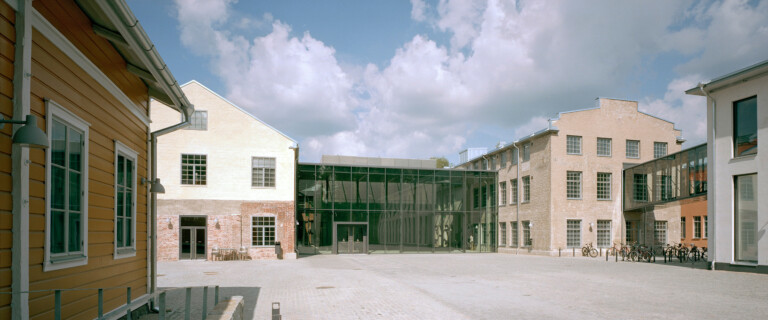Decades of sustainable construction at Sarc + Sigge
2004
The Arken block, Turku. Åbo Akademi’s Faculty of Humanities in the Åbo Järnmanufaktur industrial block. The project included repair construction of 13 buildings from 1856 to 1937 and construction of two new buildings. Winner of the invited competition in 1997, featured in the Finnish Architecture 2004-2005 exhibition.
2005
The Metla house, Joensuu University Forest Research Institute. A pilot project by Senate Properties for a wooden office and laboratory building (Winner of the invited competition in 2004).
2006 – ongoing
Keilaniemi zoning in collaboration with the City of Espoo. The Espoo Sustainable City project with the goal of a vibrant urban area that integrates public transportation and other urban structures, including office spaces, housing, and services.
2007
Hotel Katajanokka, the prison hotel, Helsinki. Radical change of use in a protected building (sr-1).
2008
Opetushallitus, Finnish National Agency for Education, Hakaniemenranta, Helsinki. Renovation of a 1975 office building (which had several times competed for the title of the ugliest building in Helsinki), reuse and modification of the existing building frame, and technical and architectural improvement of the outer envelope. Senate Properties’ construction project of the year.
2009
Pitäjänmäentie 12, Helsinki (Moveres PEAB). The first LEED certified new building in the Nordics.
2009 – 2016
Niittykumpu town planning, Espoo. City of Espoo’s pilot project for environmental classification goals during the zoning phase. Aiming for BREEAM Communities Excellent.
2013
Vuolukiventie, Helsinki. The University of Helsinki’s alliance-type renovation and additional construction project of a protected 1960s block complex, focusing on improving energy efficiency, sustainability, and innovations leading to reduced energy consumption and improved efficiency over a 30-40-year period. The alliance successfully achieved its goals during the implementation phase and in continuous and regular post-monitoring. Winner of an invitational competition.
2017
Academy House, Turku (Senate Properties). Extensive renovation, improvement of energy efficiency, and technical systems of a building completed in 1817. The building represents Gustavian neoclassicism and is one of the most significant buildings of the era.
2020
The EduCity campus, Turku (Turun teknologiakiinteistöt Oy). Educational, research, and business premises. LEED Platinum certified. Geothermal heat and solar panels as part of a hybrid heating system.
2020 – 2025
Harppuunakortteli, Turku (Merimieseläkekassa). The largest energy-self-sufficient residential and commercial block in Northern Europe. The project includes 12 buildings, a shared courtyard with communal buildings, 80 ground-source heat drillings, and 800 solar panels.
2022
Siltasaari 10, Helsinki (Antilooppi Management Oy). Extensive renovation and change of use for a complex of three, partly protected (sr-2) buildings from a department store to a multi-user commercial and office building. The client’s aim was to provide facilities that support customer well-being and productive work while considering climate goals. Particular emphasis was on providing cyclists with an experience equivalent to drivers. The reconstruction preserved parts of the old structure. LEED Platinum certification was achieved at Finland’s highest level in 2022, WELL Gold.
Puistokatu 4 – Tieteen ja toivon talo, Helsinki (TAH Foundation, Maj and Tor Nessling Foundation). Renovation of a protected villa from 1890 into an event and workspace, focusing on ecological sustainability.
2023
Porin Leijona, Pori (Senate Properties and Leijonaverkot Oy). Extensive renovation of an office building. The old concrete structure was retained, and energy efficiency improved.
2024
Signe – Mannerheimintie 14, Helsinki (Sponda Oy). Commercial and office building under construction. The project required choosing between renovation and new construction. In the project planning phase, carbon footprint and carbon handprint assessments were conducted for decision-making. LEED Platinum, WELL certification, and Class A energy rating. Green Deal sustainable demolition. The recycling and reuse target for demolition waste 99 %.
Akvacity, Turku (Turun teknologiakiinteistöt Oy). In the planning phase. A wooden office building for the waterworks of the Turku region. An energy-efficient, low-carbon solution, aiming for LEED Platinum certification.
K Tower, Espoo (Keilaniemen kiinteistökehitys Strike). In the building permit phase. A hybrid building approximately 150 meters high, containing offices and a hotel.
- The building will be one of the most ecological constructions in Europe. Based on the national building energy consumption regulations, the E-value is below 20 % (nZEB nearly zero-energy level). In international comparison, energy consumption is about 40 % lower than benchmark buildings.
- The building is aiming for LEED New Construction BD+C v4 Platinum certification (Out of 108 000 LEED-certified buildings, only 57 have this certification. Eight of them are in Europe and only one in the Nordics).
- A Platinum WELL Core v2 certification is pursued alongside LEED certification to enhance user well-being.
- The building will utilize state-of-the-art Smart Building solutions. The operating system collects, analyses, processes, predicts, controls, and transmits data on building conditions and users. The data will be used to promote ecological sustainability, well-being, and comfort.
Fabianinkatu 8, (S-Pankki). In the rezoning phase. Reuse and expansion of an existing office building from 1972, preserving the building structure. Efficient use of an empty city center plot.
